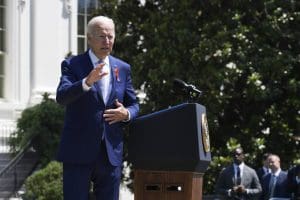Biden gives schools $280 million boost in funding for mental health issues
Funds for mental health assistance come from the recently signed Bipartisan Safer Communities Act following mass shootings in Uvalde and Buffalo

The Department of Health and Human Services announced on Monday that it is opening applications for two grant programs totaling $280 million to support mental health services for students and young people in the United States.
One grant program will send money to schools to fund the hiring of more mental health professionals, while the other will provide for an increase in the number of mental health professionals in schools by investing in partnerships between school districts and colleges and universities.
In a statement, Secretary of Education Miguel Cardona said the funding “will help schools raise the bar for student mental health by recruiting, preparing, hiring, and training highly qualified school-based mental health providers, including in underserved communities and for students such as multilingual learners and those from low-income backgrounds and in rural communities, where access to such services can be limited.”
The White House announced that HHS will also be awarding $27 million for a program designed to train pediatricians working in emergency departments to provide mental health services.
The announcements come in the midst of what experts have described as a mental health crisis in the country, particularly among young people.
In 2021, the American Academy of Pediatrics, the American Academy of Child and Adolescent Psychiatry, and the Children’s Hospital Association issued a joint statement calling the situation “a national emergency in children’s mental health.” The American Academy of Pediatrics’ president, Lee Savio Beers, said: “Young people have endured so much throughout this pandemic and while much of the attention is often placed on its physical health consequences, we cannot overlook the escalating mental health crisis facing our patients. Today’s declaration is an urgent call to policymakers at all levels of government — we must treat this mental health crisis like the emergency it is.”
The organizations noted rising rates of suicide and other mental health issues among children both before the COVID-19 pandemic and since it began, with disruptions in social life and education as well as “physical isolation, ongoing uncertainty, fear and grief” as contributing causes.
The groups said: “Children and families across our country have experienced enormous adversity and disruption. The inequities that result from structural racism have contributed to disproportionate impacts on children from communities of color.”
U.S. Surgeon General Vivek Murthy released a public advisory in December 2021 that noted, “Mental health challenges in children, adolescents, and young adults are real, and they are widespread. But most importantly, they are treatable, and often preventable.”
The funds for the new grants will come from appropriations passed by Congress in March and signed into law by President Joe Biden, as well as from the Bipartisan Safer Communities Act, which Biden signed on June 25.
While some Republicans in Congress voted for the law, a majority of them opposed its passage in the House and in the Senate.
Lawmakers pursued the Safer Communities Act in the wake of the mass shooting at a supermarket in Buffalo, New York, in May, in which 10 people were killed, and the mass shooting that same month at an elementary school in Uvalde, Texas, where 21 people were killed, 19 of them children.
The legislation also increased funding for “red flag” laws that bar individuals determined to be dangerous to themselves or others from purchasing firearms; added a federal statute against gun trafficking and purchases of firearms on behalf of other people; and closed the “boyfriend loophole” by extending bans on the purchase of firearms by people convicted of domestic abuse to include those whose victims who are not just spouses but also other types of intimate partners.
In a July 11 speech marking the passage of the act, Biden said, “This legislation is real progress, but more has to be done.” Discussing the mental health aspects of the legislation, he noted: “And this law also provides funding vital … to address the youth mental health crisis in this country including the trauma experienced by the survivors of gun violence. It will not save every life from the epidemic of gun violence, but if this law had been in place years ago, even this last year, lives would have been saved.”
Gun safety groups supported passage of the law. Everytown for Gun Safety described it as “a historic gun safety, mental health, and school safety bill,” while Brady United Against Gun Violence called the bill “historic.”
The National Rifle Association, which has repeatedly opposed legislation on gun safety while insisting that mental health issues are a major contributor to gun violence, said in a statement in June, “We will oppose this gun control legislation because it falls short at every level.”
Published with permission of The American Independent Foundation.
Recommended

Alaska House committee advances, expands proposal to bar trans girls from girls sports
Amended bill would add elementary, middle school and collegiate sports to limits in place for high school
By Claire Stremple, Alaska Beacon - April 16, 2024
Senate clears gallery, passes bill to arm Tennessee teachers
Covenant parents emotional in wake of vote
By Sam Stockard, Tennessee Lookout - April 10, 2024
Not if, but when: Parents of slain Parkland students urge Utah lawmakers to pass school safety bill
The parents of children killed in the 2018 Marjory Stoneman Douglas High School shooting have a stark warning for Utah lawmakers: “It’s not a matter of if, it’s a matter of when and where the next school shooting will happen.”
By Kyle Dunphey, Utah News Dispatch - February 21, 2024









































































